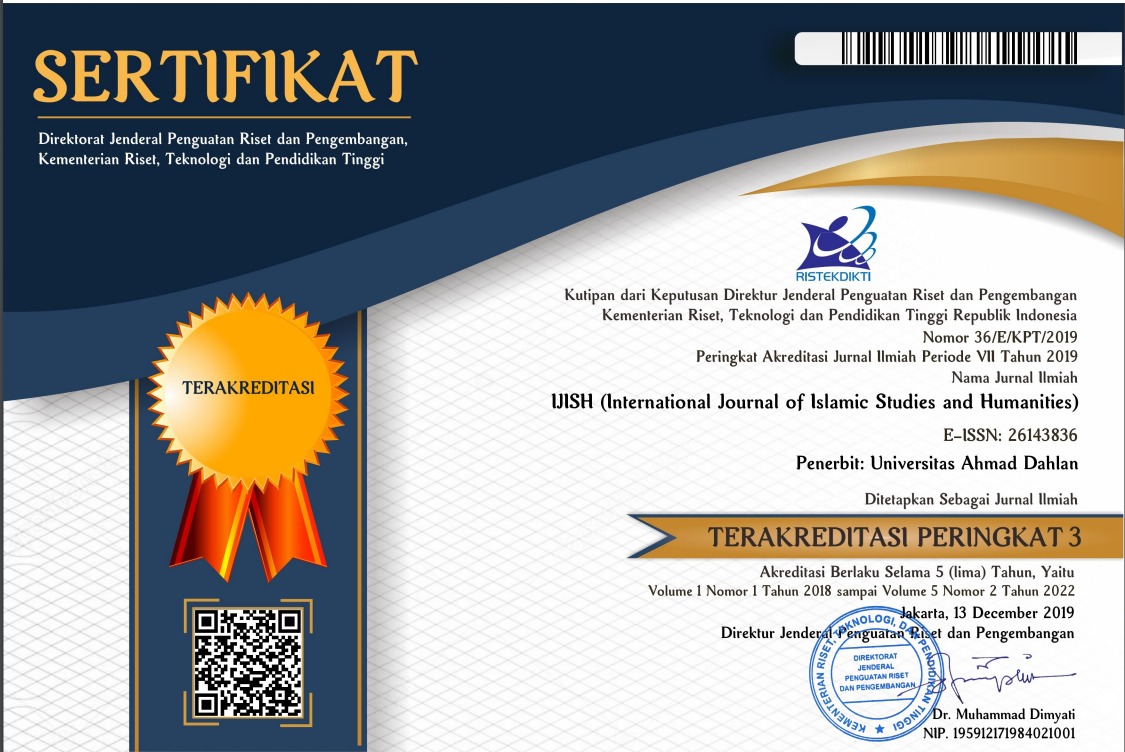The Hadith of Rukyatu al-Hilāl and Its Contextualization According to the Maqāşid As-Syarī’ah Perspective
DOI:
https://doi.org/10.26555/ijish.v3i1.1495Keywords:
Contextualization, Rukyatu al-Hilāl, , Maqāşid as-Syarī’ahAbstract
The purpose of this research is to discuss the urgency of the understanding of hadith rukyatu al-hilāl in a more comprehensive and contextual manner within the framework of Maqāshid Syarīah. This is because the understanding of the hadith rukyatu al-hilāl has an impact on the method of determining the entry of the early qamariyah months, especially those related to worship such as the fasting of Ramadhan, Eid al-Fitr and Eid al-Adha. There are many hadith about the Prophet's order to see the new moon in order to find out the entry of the fasting month of Ramadan as well as the Eid-ul-Fitr festivities, because rukyat at that time was the only method for determining the entry earlier that month. There is no doubt that the aim of Islamic law is to realize the benefit of mankind in the world and the hereafter and keep away all forms of difficulties. While, understanding the hadith of the rukyatu al-hilāl and its implementation textually sometimes cause confusion and difficulties as well as differences that often occur in the determination of the beginning of the month of qamariayah, especially those related to fasting, Eid al-Fitr and Eid al-Adha.
References
Musthafā, Ibrāhim. Al-Zayyāt, Ahmad. Abd Qādir, Hāmid. Al-Najjār, Ahmad. Al-Mu’jam al-Wasīth, Beirut : Maktab as-Syurūq al-Dauliyah, 2004.
Al-Fāsī, Muhammad ‘Alal Ibn ‘Abd al-Wāhid, Maqāşid as-Syarī’ah al-Islāmiyah Wa Makārimuhā Wa Difā’ ‘an as-Syarī’ah, Kairo : Dār as-Salām, 2011.
Adam, Hamd Utsman. Mu’ad, al-‘Abīd. An-Nīl, Hasan ‘Abd Hamd. Islāh al-Mujtama’ Fī Mandzūr Maqāşid as-Syarī’ah al-Islāmiyah Dirāsah Tahlīliyyah, (PhD Thesis), Jāmi’ah as-Sūdān Li al-‘Ulūm Wa at-Tiknūlujiyā, 2015.
Ibn Taimiyah, Taqiyuddīn Abu al-‘Abbās. Majmū’ al-Fatāwā. Saudi Arabia : Wizārah as-Syu’ūn al-Islāmiyah wa ad-Da’wah wa al-Irsyād as-Sa’ūdiyyah, 2004.
Ibn al-Qayyim, Syamsuddīn Abū ‘Abdillah Muhammad Ibn ‘Abī Bakr. I’lām al-Muwaqqi’īn ‘an Rabbi al-‘Âlamīn, Beirut : Dār al- Fikr li at-Tibā’ah wa an-Nasyr wa at-Tauzī’, 2003.
Anwar, Syamsul. Interkoneksi Studi Hadis dan Astronomi, Yogyakarta : Penerbit Suara Muhammadiyah, 2011.
Anwar, Syamsul. Uşūl al-Fiq Dirāsah Naqdiyyah fī Âliyāt Iktisyāf al-Ahkām as-Syar’iyyah, Yogyakarta : LPPI Universitas Muhammadiyah Yogyakarta, 2019.
Ibn ‘Âsyūr. Muhammad at-Thāhir. Maqāşid as-Syarī’ah al-Islāmiyah, Tunisia : Dār Sukhūn li an-Nasyr wa at-Tauzī’, 2007.
Ar-Raysūni, Muhammad. Maqāşid as-Syarī’ah, Beirut : as-Shabakhah al-‘Ârabiyyah, 2013.
As-Shāthibī, Abu Ishāq. Al-Muwāfaqāt Fī Uşūl as-Syarī’ah, Beirut : Dār al-Fikr, 2005.
‘Abd as-Salām, ‘Izzu ad-Dīn Ibn ‘Abd al-‘Azīz, Qawā’id al-Ahkām Fī Maşālih al-Anām, Kairo : Maktabah al-Kulliyāt al-Azhariyah, 1991.
Al-Ghazālī, Abū Hāmīd, Al-Mustasyfā Min ‘Ilmi al-Uşūl, Beirut : Dār al-Kutub al-‘Ilmiyyah, 1997.
Thahir, Halili. Ijtihād Maqāşidī Rekonstruksi Hukum Islam Berbasis Interkoneksitas Maslahah, Yogyakarta : LKiS Printing Cemerlang, 2015.
As-Syaukāni, Muhammad Ibn ‘Ali, Fathu al-Qadīr al-Jāmi’ Baina Fanni ar-Riwāyah wa ad-Dirāyah Min ‘Ilmi at-Tafsīr, Beirut : Dār al-Ma;rifah, 2013.
As-Sa’dī, Abdurrahman Ibn Nāshir. Taisīr al-Karīm ar-Rahmān Fī Tafsīr Kalām al-Mannān, Beirut : Muassasah ar-Rislah, 2000.
Ibn Daqīq al-‘Īd, Muhammad Ibn ‘Ali, Ihkām al-Ahkām Syarh ‘Umdah al-Ahkām, Beirut : Maktabah al-‘Asriyyah, 2005
Qardhawī, Yusuf. Kaifa Nata’āmal Ma’a as-Sunnah an-Nabawiyyah. Mesir : Dār as-Syurūq, 2013
Ya’qub, Ali Musthafa, At-Thuruq as-Shahīhah Fī Fahmi as-Sunnah an-Nabawiyyah, Jakarta : Maktabah Dār as-Sunnah, 2016.
Downloads
Published
How to Cite
Issue
Section
License
Copyright (c) 2020 Fajar Rachmadhani

This work is licensed under a Creative Commons Attribution-ShareAlike 4.0 International License.
Authors who publish with IJISH (International Journal of Islamic Studies and Humanities) agree to the following terms:
- Authors retain copyright and grant the journal right of first publication with the work simultaneously licensed under a Creative Commons Attribution License (CC BY-SA 4.0) that allows others to share the work with an acknowledgment of the work's authorship and initial publication in this journal.Â
- Authors are able to enter into separate, additional contractual arrangements for the non-exclusive distribution of the journal's published version of the work (e.g., post it to an institutional repository or publish it in a book), with an acknowledgment of its initial publication in this journal.
- Authors are permitted and encouraged to post their work online (e.g., in institutional repositories or on their website) prior to and during the submission process, as it can lead to productive exchanges, as well as earlier and greater citation of published work.

This work is licensed under a Creative Commons Attribution-ShareAlike 4.0 International License.






